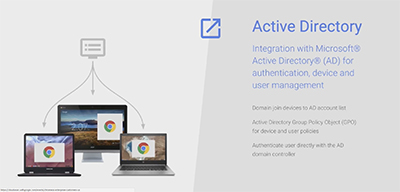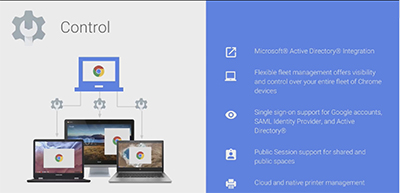News
Google Targets Businesses with Chrome Enterprise Offering and VMware Management Partnership
Google this week announced a new Chrome Enterprise license, its latest effort to bring the Chrome OS operating system and Chromebook laptops into the business world.
The company also announced a partnership expansion with VMware to facilitate the lifecycle management of Chromebook devices using VMware's Workspace One technology. The expanded effort also encompasses mobile device management capabilities using VMware's AirWatch solution, plus the ability to access Windows applications on Chromebooks using VMware's Horizon virtual desktop infrastructure technology.
In its corresponding announcement, VMware claimed to be "the first unified endpoint management (UEM) provider with full Chrome device management capabilities." The integration effort permits access to "full Windows desktops" by organizations, as well as "access to all enterprise applications -- cloud, web, native Android, virtual Windows -- from a single app catalog," according to VMware's announcement.
Active Directory Support
Google's Chrome Enterprise efforts were outlined in a Web presentation today by Rajen Sheth, a senior director of product management for Google Chrome and Google Cloud. In general, Sheth depicted the Chrome Enterprise license as offering a single management approach for organizations that would permit anywhere access to applications by end users, including Chrome OS apps and Android apps from the Google Play store, as well as Windows apps through VMware's Horizon technology.
One notable point in Sheth's talk was the ability of organizations to create domain-joined devices using Microsoft's Active Directory identity and access management solution with the Chrome Enterprise technology.
The Chrome Enterprise license isn't Google's first effort to address the business market with Chrome OS, a browser-based operating system that's tied to the Google Play store. The new license is replacing the currently existing Chrome Management license that's used by organizations. Those Chrome Management licensees will be "automatically upgraded to Chrome Enterprise," a Google spokesperson indicated, during the Q&A portion of the talk.
Google also is describing the Chrome Enterprise license as having more robust management capabilities than the current Chrome Management license.
"Chrome Management license has outgrown its name and capabilities and is being replaced by Chrome Enterprise license," a Google spokesperson indicated during the Q&A portion of Sheth's talk. "In fact, there are many new features that are now included in Chrome Enterprise including Microsoft Active Directory Integration, third-party EMM [enterprise mobility management] integration with AirWatch as the first EMM to support and native Print management for cloud and local printing."
Sheth made the argument that that there are 3.2 billion workers but "only 750 million PCs out there" and that many people don't have access to PCs on a daily basis. Companies are looking at using shared devices, kiosks and meeting devices for videoconferencing, but computers should be easier to manage at a lower cost. He claimed that Chrome OS devices currently are the "leading" devices used in U.S. education markets and that the trend is catching on for businesses, too, particularly as they move toward using cloud services.
Organizations are moving toward using mobile devices, but they want control over them. With Chrome Enterprise, Chrome OS can be integrated with Microsoft Active Directory, and there's "native" integration with printers, too, Sheth argued.
"We're including now integration with Microsoft Active Directory, and so customers can be able to sign in to Active Directory as well as join a domain with Active Directory," Sheth said. He added that "you're able to actually push a set of policies from Active Directory to the Chromebook, and you can authenticate directly to Active Directory, and what we do is that when you do that, we give you the power of that login, as well as a Google login, to give you access to all of your applications."
Here's Google's slide on the Active Directory capabilities of Chrome Enterprise licensing:
 [Click on image for larger view.]
Figure 1. Active Directory support with Chrome Enterprise. Source: Google presentation on Aug. 23.
[Click on image for larger view.]
Figure 1. Active Directory support with Chrome Enterprise. Source: Google presentation on Aug. 23.
Other Management Capabilities
With regard to the native printing capabilities of the Chrome Enterprise license, Sheth said that "customers don't have to change anything to be able to print with a Chromebook, which was a pain point previously for enterprises."
The overall management capabilities of Chrome Enterprise licensing are summed up in this slide:
 [Click on image for larger view.]
Figure 2. Chrome Enterprise management controls. Source: Google presentation on Aug. 23.
[Click on image for larger view.]
Figure 2. Chrome Enterprise management controls. Source: Google presentation on Aug. 23.
Chrome Enterprise licensing offers a few other capabilities over the consumer Chrome OS model. As illustrated on the Chrome Enterprise landing page, there's a "managed Google Play Store" (currently at the beta stage) for distributing applications to end users. There are management capabilities for Chrome extensions and Chrome browsers. Single sign-on access is supported, and there's device theft prevention. Chrome Enterprise licensing also offers controls for "managed networks and proxies," as well as "managed OS updates." Lastly, Google claims there's "24/7 enterprise support."
It's also possible to manage virtual private networks using the solution, according to this Google support page.
Google is touting the security protections of Chrome OS devices. They are required to have hardware security modules installed. The firmware of the devices will check for any unwanted configuration changes with a "verified boot" feature. Other Chrome OS security features include "privilege separation, process sandboxing, full disk encryption and automatic updates," according to a slide in the presentation.
The cost of Chrome Enterprise licensing is listed as "starting at $50 per device, annually." The VMware management capabilities are separate costs, though, per Google's Q&A.
About the Author
Kurt Mackie is senior news producer for 1105 Media's Converge360 group.